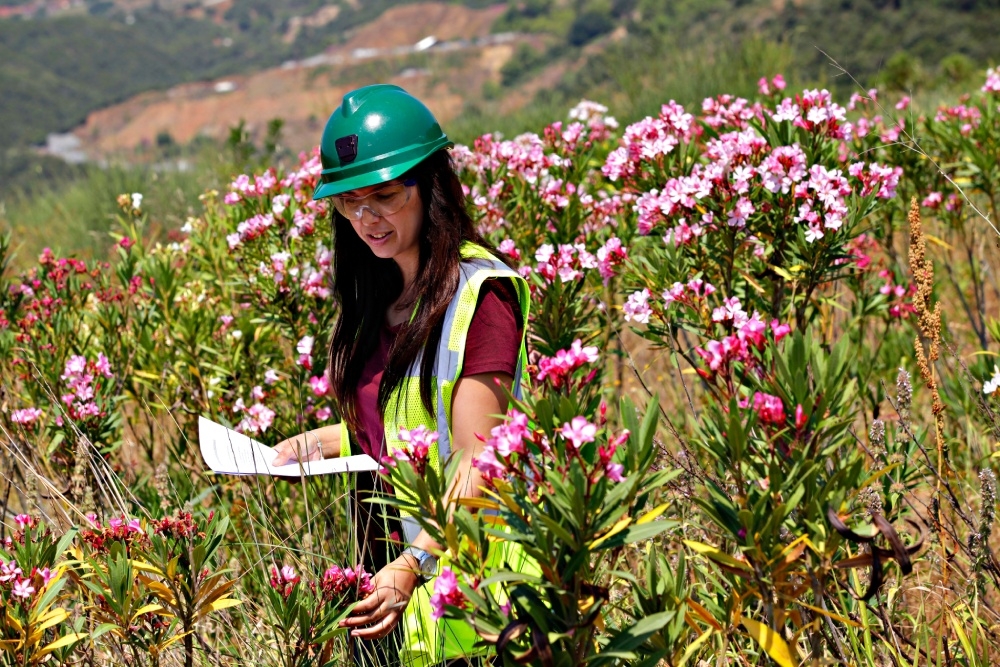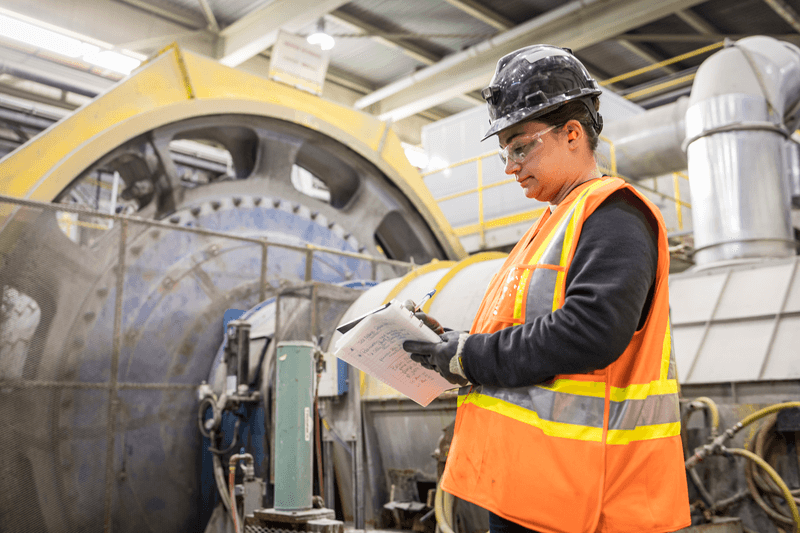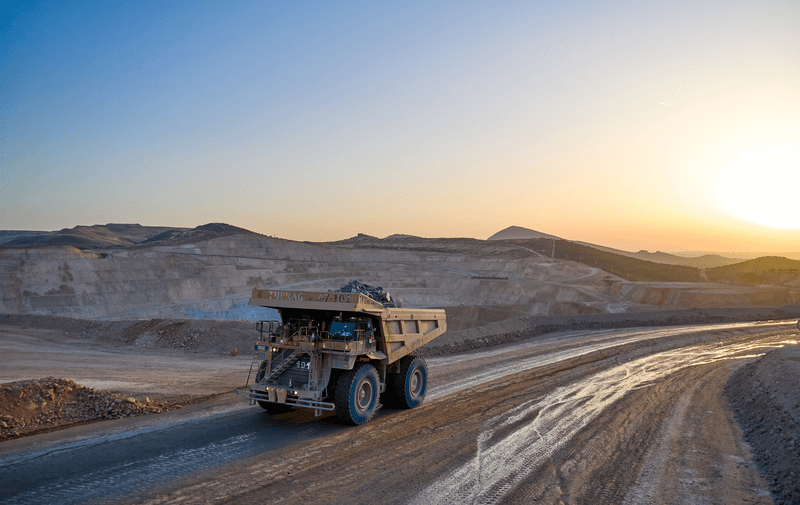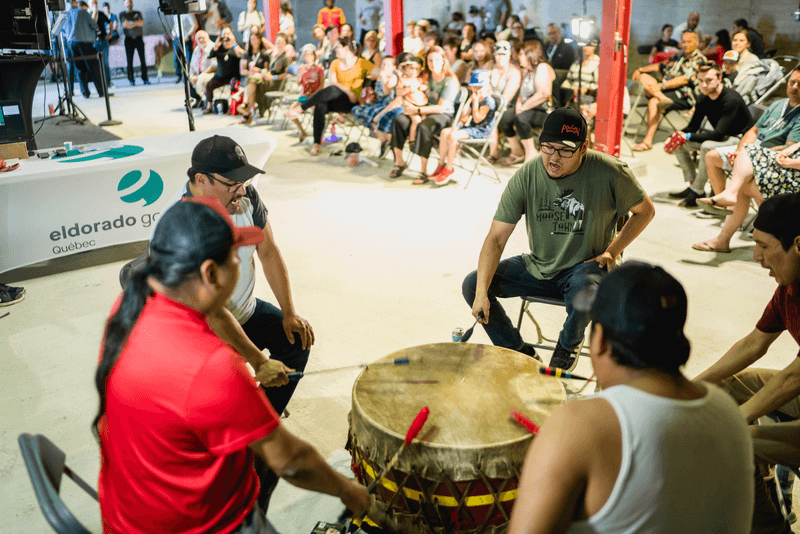HEALTHY ENVIRONMENTS NOW AND FOR THE FUTURE
OUR COMMITMENT TO HEALTHY ENVIRONMENTS NOW AND FOR THE FUTURE
We carefully plan, design and build operations to mitigate our environmental impacts, and work with host communities and governments to ensure that our operations meet acceptable standards of practice and adhere to regulations. By investing in technologies and implementing leading environmental practices, where feasible, we seek to safely manage tailings and waste, restore disturbed land, reduce our water and energy consumption and protect the ecosystems surrounding our sites.
ENERGY AND CLIMATE CHANGE
Our Climate Change Strategy consolidates our approach to managing climate-related risks, opportunities and impacts. The Climate Change Strategy is part of our Sustainability Framework, which embodies our pledge to incorporate sustainability from the ground up as we enact our corporate vision. Our strategy is aligned with recommendations of the Task Force on Climate-related Financial Disclosures (TCFD).
Climate change is a global issue that has the potential to impact our operations, stakeholders and the communities in which we operate. To support the resilience of our business from the direct effects of climate change, as well as the ways the world may respond to climate change, we regularly seek to understand the risks, opportunities and impacts that may arise.
To better understand how climate change could impact our business over the short-, medium- and long-term, we completed updates to physical climate risk assessments at the Lamaque Complex, Kışladağ, Efemçukuru and Olympias operating mines and the Skouries Project in 2024. These assessments represent a foundation for our climate-related adaptation efforts that will be continued over the coming years.
For further discussion of our climate change risks and opportunities, including physical and transition risks and opportunities, please see our latest Climate Change & GHG Emissions Report.
Environmental Compliance
As a global company, we have varying environmental laws and regulations in each of our operating jurisdictions. We work closely with our regional teams to understand local regulations and ensure our environmental practices meet these requirements at a minimum.
SIMS provides environmental performance requirements for all of our sites, alongside regional regulations. We align our operations to international best practices and standards, including MAC’s TSM Framework.
ENVIRONMENTAL IMPACT ASSESSMENTS
As our projects advance, we conduct environmental impact assessments (EIAs) to evaluate the potential impacts of a project on the environment and those who depend on it. As part of permitting, we submit environmental-impact management and mitigation plans to regulators and work with a wide range of stakeholders to understand, assess and mitigate our impacts.
Once completed, EIAs are comprehensive documents that include baseline studies used to assess the current state of the environment at the proposed mine site and the potential impacts that could result from mine development. Our approach is to avoid, minimize and mitigate environmental impacts to the extent practicable.
At the end of 2021, we submitted a revised Environmental Impact Study to regulators in Greece following updated designs and plans for the Kassandra Mines. Following a public consultation period with Greek regulators during 2022, the EIA was approved in April 2023.
Our GHG Emissions Mitigation Target
As we implement our Climate Strategy to reduce GHG emissions, we recognize the importance of holding our progress to account through measurement and disclosure.
Current GHG Emissions Mitigation Target: To mitigate Scope 1 and Scope 2 GHG emissions by an amount equal to 30% of our 2020 baseline from current operating mines by 2030, on a “business-as-usual” basis.1
We believe our 2030 GHG emissions mitigation target is achievable and measurably contributes toward a lower-carbon future. By the end of 2023, we had achieved 36% of our targeted mitigation.
Operating mines included in the target are the Lamaque Complex, Kışladağ, Efemçukuru, Olympias and Stratoni. Across our operations, we do not expect uniform GHG emission mitigations from each operating mine. Progress toward the target will be measured on a discrete project-by-project basis by quantifying GHG emission mitigations relative to a “business-as-usual” scenario. As new mines come into operation, our GHG emissions may increase. While operations other than those listed above are not currently included in our target, we will incorporate GHG emission reduction strategies into the planning, design, and construction of new projects, such as through implementation of energy efficient systems, technologies and processes and procurement of energy from low-carbon and renewable sources, in alignment with our Climate Change Strategy.
1 Our target to mitigate Scope 1 and Scope 2 GHG emissions by an amount equal to 30% of our 2020 GHG emissions baseline from current operating mines is equal to approximately 59,000 tCO2e.
TAILINGS & WASTE
We are committed to implementing industry best practices in tailings management.
Our tailings management stewardship is a point of pride, and we work to minimize associated risks through the use of technologies, such as filtered tailings. We also implement leading management practices such as establishing an Independent Technical Review Board (ITRB).
Our Technical Services, Operational Support function oversees and manages our tailings facilities. We rely on Engineers of Record and third-party experts to support the design, construction, operation, maintenance, surveillance and closure of tailings facilities. Our EVP, Technical Services & Operations is responsible for overseeing the operation, management and commercial matters related to tailings management facilities. Ultimately, our President & CEO is responsible for the Company’s tailings management practices. Our Technical Committee of the Board provides oversight of technical matters related to tailings, and the Sustainability Committee has oversight of sustainability-related tailings matters.
Our Global Tailings Stewardship Program integrates with SIMS and leading external frameworks, including TSM and the RGMPs, and seeks to bring consistency and create a shared knowledge base across our global operations. The program captures all stages and areas of tailings management and governance, including design, construction, operation, closure, monitoring, inspection, analysis, risk assessment, audit, training, emergency response and preparedness, stakeholder engagement and communications.
Implementing Leading Practices
Tailings are created when mined ore is processed through water-based solutions to separate valuable metals from surrounding rock. Once metals are separated and collected, the remaining mixture of water, waste rock and residual chemicals must be stored securely.
Tailings are typically stored in a slurry form, within purposely constructed tailings dams or tailings management facilities (TMFs). Properly designed, constructed and maintained TMFs pose manageable risks when maintained according to designed conditions. Tailings containment failure is typically due to design conditions not being maintained. Containment failure of wet tailings has higher consequences to the surrounding environment due to higher flow-ability than filtered tailings.
Filtered tailings results from an alternative method of tailings management that removes most of the water from tailings. The water is recycled for future mining uses or treated and discharged into the environment and the filtered tailings are transported and stored in TMFs.
We currently have filtered tailings at our Efemçukuru and Olympias mines. Filtered tailings from the Olympias mine are stored at the Kokkinolakkas Tailings Management Facility (KTMF). As a heap leach operation, Kışladağ does not produce tailings. Our SIMS aligns with internationally recognized best practice and corporate commitments under the WGC’s RGMPs and MAC’s TSM. Lamaque, Olympias and Efemçukuru underwent Eldorado’s SIMS Compliance Verification in 2022, 2023 and 2024, respectively, and all achieved Level AAA under the MAC-TSM Tailings Management Protocol based on an external verification, which is the highest level of performance a site can achieve.
We maintain an ITRB to further strengthen design, operational and governance practices. In 2024, the ITRB engaged with our global tailings management teams and conducted site visits at Olympias, KTMF, Skouries, Efemçukuru and Kışladağ. The ITRB reviewed design, construction and management of various facilities, including those for management of tailings, water and waste rock, and the site visits provided opportunities for our internal teams to learn from experienced professionals on safe design, construction and operation of tailings and other facilities. The ITRB process continues to provide us with valuable opinions and non-binding recommendations to continuously strengthen the safety of our tailings facilities globally. The ITRB will seek to conduct biennial reviews of our tailings management facilities globally.

Heap Leach Management
In Türkiye, at our Kışladağ mine, we operate heap leach facilities to extract gold from mined ore and, in doing so, we apply strict management practices and voluntary standards to mitigate associated risks and uphold the safety and health of our people, host communities and the environment.
At the Kışladağ mine, we operate both the South Heap Leach Pad (SHLP) and North Heap Leach Pad (NHLP). We commenced stacking on the newly constructed North Heap Leach Pad in July 2023 as the SHLP comes to end of life. Heap leaching starts with placing crushed ore onto a dedicated, lined area, called a heap leach pad, using conveyors. New ore is stacked in layers known as “lifts,” which are separated by liners constructed of high-density polyethylene membranes or compacted material. Diluted cyanide solution is irrigated though the stacked ore to leach out gold. The interlift liners direct the gold-laden solution to a system of collection pipes leading to lined ponds before it is pumped to a processing plant. Dissolved gold is recovered at the adsorption, desorption and regeneration (ADR) plants using activated carbon and further refined into gold doré.
Once ore leaves the crushing plant at Kışladağ, it travels via electric conveyors to reach the heap leach pad, mitigating significant quantities of GHG emissions that would result from truck haulage as an alternative transport method. Opportunities in support of our Climate Change Strategy and GHG emissions mitigation target are under investigation for the heap leach facilities, including energy efficiency measures for the conveyor system and the process solution pumping circuit.
Responsible water management is a key priority in the design and operation of our heap leach facilities. The mine is bounded by a series of collection ditches that divert non-contact water around the site, while all contact water within the site, including the heap leach facilities, is collected in ponds for treatment and reuse. All ponds, including those containing cyanide solution, are lined with double high-density polyethylene membranes and fitted with leak detection pipes and pumps. All ponds are designed to withstand, at a minimum, a 100-year, 24-hour storm event. Ponds are covered with floating high-density polyethylene (HDPE) balls or bird netting where appropriate to reduce evaporation and to inhibit wildlife contact with the cyanide solution. Continuous treatment of contact water and recirculation of process solution mean that Kışladağ recycles most of the water it withdraws.
In addition to the heap leach facility process ponds, there are several additional ponds available, including a dedicated storm water event pond to contain excess overflow solution and a second to manage a storm water event that exceeds the one-in-100-year condition. Facilities are designed to keep water and solution in a closed circuit. An emergency hydrogen peroxide detoxification circuit is in place to reduce the cyanide concentration of solution that may be discharged under extreme circumstances. As water is limited in the region, local communities are supplied with potable water from sources several kilometres away from the mine site. We supported the construction of potable water infrastructure in the region and continue to support the maintenance of this infrastructure as discussed in the Community Investment section of this report.
Kışladağ has maintained an environmental management plan since before it entered production that includes an extensive monitoring program for elements such as surface water and groundwater, flora and fauna, waste and hazardous waste storage, as well as social factors. To rehabilitate areas no longer needed for operations, the mine uses progressive reclamation techniques that are in alignment with SIMS Standards and international frameworks.
We are a signatory to the International Cyanide Management Institute (ICMI). As a requirement in SIMS, the Kışladağ mine adheres to the International Cyanide Management Code (ICMC), a voluntary certification program of best practices for the management of cyanide in gold mining and was recertified for a fourth time following an independent audit in 2022
Water Stewardship
Availability and access to water is critical for our mining operations. We use water for mineral processing, dust suppression, slurry transport and personal consumption. Responsible management of water resources is therefore essential to our long-term sustainable development and to our environmental stewardship and relationships with local stakeholders.
Our SIMS Water Stewardship standard requires sites to seek continuous improvement of water efficiency through water recycling, where feasible. We monitor and manage our water use to minimize waste, and each operation is implementing practices in support of this objective.
Water use is continuously monitored using flow meters, and we regularly take water quality samples from groundwater and surface water sources within and around our sites. We compare water-quality results with the limit values set out in pertinent regulations and our operating permits, and we share these detailed results with regulators and government, typically on a quarterly basis.
Environmental teams at each of our sites are responsible for day-to-day water management activities, including implementation of our policies, programs and engaging with regulators. They report through the Mine General Manager, and our EVP, Technical Services & Operations is responsible for overseeing water management and performance across our operations. Ultimately, our President & CEO is responsible for the Company’s water-related matters, and independent oversight is provided by the Sustainability Committee of the Board.
Some regions where we operate, including Türkiye, are more prone to water stress, and we work carefully to manage water as a shared resource. In some regions, such as Greece, water stress can be accompanied by periods of increased precipitation. Our SIMS Water Stewardship standard provides a set of minimum performance requirements for our water management practices, including managing water in conformance with Level A of the MAC-TSM Water Stewardship Protocol. All of our operations have undergone SIMS Compliance Verifications and have achieved minimum Level A against the MAC-TSM Water Stewardship Protocol, with the Lamaque Complex achieving Level AAA in 2022, based on external verifications.

Interactions with Water
Withdrawal
Definition:
All water drawn from surface water, groundwater, seawater, or a third party for any use
How we interact with water
Most of our water withdrawals are resultant of pumped water that has infiltrated the mines, originating from renewable groundwater sources, and used predominantly in ore processing. Water withdrawals are done in accordance with local regulations and our applicable permits.
Consumption
Definition:
All water that has been withdrawn and used in production, evaporated, transpired, generated as waste, stored, or otherwise rendered unusable to others, and is therefore not released back to surface water, groundwater, seawater, or a third party
How we interact with water
Recycled water makes up the majority of our water consumption, particularly at those sites where we have zero water-discharge requirements. Where possible, we seek to recycle water in processes and across our operations. Recycled water is used for mineral processing, dust suppression and slurry transport as well as throughout our leach pad areas and adsorption, desorption, recovery (ADR) carbon plants. Water is also stored in TMFs and used for human consumption onsite, and minor losses are attributable to evaporation.
Discharge
Definition:
All water that has been used or unused and released to surface water, groundwater, seawater, or a third party
How we interact with water
All water that comes into contact with our sites is treated and tested before being discharged back to the environment (e.g., rivers, lakes, and reinjection into groundwater). We discharge water in accordance with local regulations and our applicable permits and licenses. Some of our sites, such as Skouries, have zero water-discharge requirements.
Air Management
We recognize the potential impacts of air pollution and dust to our workforce, surrounding communities and the environment, and we are taking steps to minimize emissions and dust at our operating sites. Within SIMS, we have established an Air, Noise and Vibration Management standard that aligns with internationally recognized best practices, such as the IFC General EHS Guidelines, and includes requirements, such as maintaining dust control and air quality monitoring plans. At operations that generate more dust due to weather conditions and open pit activities, we are taking steps to monitor and manage particulate matter in accordance with the World Health Organization’s global air quality guidelines, through methods such as dust suppression solutions on haul roads during drier months.
BIODIVERSITY & RECLAMATION
We design and construct our projects to minimize land disturbance while prioritizing a safe working environment for our employees and contractors. Across our operations, we progressively reclaim and rehabilitate land, rather than waiting until the end of mine operations.
Constructing and operating our mines can have an impact on local land, environments and communities. Environmental reclamation practices such as deconstructing closed facilities, treating contaminated soil and revegetating areas where trees and/or other plants were removed help to revitalize the impacted land. Environment teams at each of our sites are responsible for reclamation activities, under the direction of the respective Mine General Manager and EVP, Development, Greece, VP & Country Manager, Canada and VP & Country Manager, Türkiye for their respective jurisdiction. At the corporate level, our EVP, Technical Services & Operations is responsible for the reclamation of disturbed land. Ultimately, Eldorado’s President & CEO is responsible for advancing environmental reclamation, and these activities are overseen by the Sustainability Committee at the Board level.
We consider biodiversity, reforestation and reclamation in our planning and management activities. We operate plant nurseries at Olympias and Kışladağ for the reclamation of both historical and current mining areas. To date, we have planted over 118,000 indigenous plant species over an area of 106 hectares at Kışladağ, including complete reclamation of the waste rock area, and thousands more to local villages, proudly contributing to revegetation and reforestation of the surrounding region. In 2024, we moved nearly 288,000 tonnes of historical tailings, pyrites and contaminated soils from Olympias and Stratoni to be properly stored in the KTMF, hauled over 29,000 tonnes of topsoil for rehabilitation of Olympias historical tailings area, and seeded a combined 1.7 hectares to revegetate historical stockpile waste rock, KTMF, and other areas with indigenous flora. At Efemçukuru, we completed rehabilitation of the Center Tailings Storage Facility after it reached its final storage capacity.





